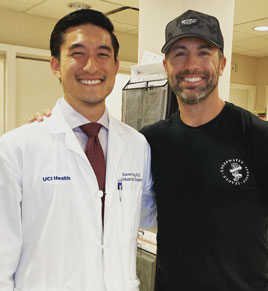
Total Knee Replacement
We understand how knee pain can impact your daily life. UCI Health offers total knee replacement surgery, using the latest treatments to return you to a pain-free, active life.
This safe procedure, also called arthroplasty, can relieve pain and correct deformities so you can return to your usual activities.
Our approach to knee replacement
Initial screening
During your initial examination, your physicians will take X-rays of your knee, compare them to any previous imaging and conduct a full medical history and physical. They will ask about your mobility limitations and functionality and examine your gait and range of motion.
Treatment plan
Once our specialists diagnose your condition, they will work closely with you to develop a treatment plan.
Your physician will exhaust all non-surgical options, working with a multidisciplinary team that includes other orthopaedic physicians, physical therapists and sports medicine specialists. If you require surgery, you can be assured that it will be as quick and painless a procedure as possible.
Recovery
Within a week of your surgery, one of our nurse navigators will follow up with you to monitor your recovery. Typically, you'll have home health physical therapy for the first six weeks, often working with a nurse who will come to your home.
We also offer a medication pathway if you require a lot of medication post-surgery. It’s designed to reduce your risk of dependency by prescribing different medications that work synergistically.
When is knee replacement needed?
Knee replacement is recommended when:
- You have severe pain and/or stiffness that interferes with your daily life. You find it difficult to stand up or sit down, and walking more than a few blocks without a cane or walker causes you pain.
- You have knee pain while at rest.
- Your knee has chronic inflammation and swelling that isn't helped with medications or rest.
- Your knee has become deformed.
- Conservative treatments, such as anti-inflammatory medications, physical therapy or cortisone injections, aren't effective.
Who needs knee replacement?
Your age or weight are not factors in determining whether you should have knee replacement surgery.
The primary considerations are your level of pain and disability.
Most patients who require total knee replacement are 50 years of age or older, although anyone may be eligible for it.
How long will I have to stay in the hospital?
Patients typically stay in the hospital for two or three days after surgery. You may qualify for the Rapid Recovery Program, which is an accelerated rehabilitation program for all patients who are planning to be discharged to their homes. Your surgeon will provide you with further details.
How long will my knee replacement last?
How long your new knee will last depends on your age and activity level. Generally, artificial joints last about 20 to 30 years. If you are young and active, it may eventually need to be replaced. If you are older and less active, it may never need to be replaced.

Get up and moving again
Contact a specialist to learn if knee replacement surgery is right for you.
Call us at 714-456-7012 to make an appointment, or
Benefits of knee replacement
Knee replacement surgery at UCI Health can offer you several key benefits:
- Pain relief: You’ll experience significant pain relief, often lasting, from arthritis or injury.
- Improved function: Your knee function will improve, making daily activities like walking and climbing stairs easier.
- Faster recovery: Minimally invasive options mean quicker healing and shorter hospital stays for you.
- Increased mobility: You’ll regain mobility and be able to return to normal activities with less discomfort.
- Personalized care: UCI Health provides a treatment plan tailored to your needs, using advanced techniques for the best results.
What to expect of knee replacement surgery
When surgery is required, you can be assured that it will be as quick and painless a procedure as possible.
Depending on the surgery, 80-90% of UCI Health knee surgery patients fully recover in three months, with around 60% recovering by six weeks.
Preparation steps:
- Medical evaluation: Your doctor will assess your overall health to ensure you are ready for surgery
- Testing: Expect blood tests, urine tests and possibly an electrocardiogram to check your heart health.
- Home preparation: Arrange for transportation and help at home. Modify your living space for easier movement and safety.
- Weight management: If needed, lose weight before surgery to reduce stress on your knee. Pool exercises can be helpful.
Before surgery:
- Anesthesia: You will receive anesthesia to ensure you are comfortable and pain-free during the procedure.
Surgery:
- Incision and repair: The surgeon will make an incision in your knee, replace the damaged parts with artificial components and check for proper movement.
Recovery:
- Hospital stay: You will stay in the hospital for about two days. During this time, we will monitor your recovery and vital signs.
Physical therapy: A physical therapist will work with you soon after surgery to begin exercises that aid in recovery.
Related tests and treatments
Before determining whether knee replacement surgery is right for you, your surgeon may conduct some or all of the following tests and treatments:
- A full physical examination
- A complete medical history review
- Imaging tests like X-rays, sometimes supplemented with an MRI scan
- Blood tests to assess overall health and suitability for surgery
- Joint fluid analysis to test for inflammation
What happens after my knee replacement
After surgery
During your hospital stay, move your ankle and foot regularly to prevent swelling and blood clots. Your doctor might recommend blood thinners and support stockings to help with this.
The day after surgery, a physical therapist will help you exercise your new knee and create a follow-up exercise plan for home.
At home
To support a smooth recovery:
-
Keep your incision clean and dry
-
Eat a balanced diet to aid healing and rebuild muscle strength
-
Follow your activity program, including walking and knee-strengthening exercises. Avoid high-impact activities
Within six weeks, you should return to light activities and driving. You might notice a soft clicking in the joint while moving. Continue working with your physical therapist and consider water-based exercises to ease pain and improve motion.
When to call your doctor
Contact your doctor if you notice:
-
Signs of infection, like fever or chills
-
Redness, swelling, increased pain or discharge from the incision
-
Unmanageable pain, nausea or vomiting
-
Cough, shortness of breath or chest pain
-
Discoloration or numbness in your leg, foot or toes
-
Pain or blood in your urine
For emergencies, seek medical help immediately.
Why choose UCI Health for knee replacement?
Expert care team
At UCI Health, our knee replacement team includes top orthopedic surgeons, physical therapists and pain management specialists. This coordinated approach ensures comprehensive, personalized care for optimal outcomes.
Innovative techniques
We utilize advanced, minimally invasive surgical techniques and the latest technology to enhance precision and reduce recovery time. This means you experience less pain and a quicker return to daily activities.
Patient-centered approach
We offer a holistic, patient-centered experience, focusing on your unique needs and preferences. Our emphasis on individualized care improves your overall recovery and satisfaction.
High patient satisfaction
UCI Health is known for high patient satisfaction scores. Our commitment to providing compassionate care and effective treatments ensures you receive the best possible experience and results.
Comprehensive follow-up
Our robust follow-up care program includes ongoing physical therapy and support. This comprehensive approach helps you recover fully and maintain long-term joint health.
We’re Orange County’s only academic medical center
We conduct unique research; our physicians are involved in the latest studies and clinical trials. If you qualify, you may get access to new treatments and techniques not yet widely available.
Featured Blog Posts

Live Well’s most popular stories of 2023
Take a peek at our readers' favorite articles of the year.

Partial knee replacement revitalizes life of Marine

Living full throttle after hip replacement surgery
After being told he was too young for hip surgery and advised to get a knee replacement instead, 55-year-old retired Marine Corps officer Scott Shuster sought a second opinion at UCI Health.
Upcoming Events
12-1 p.m. +7 more dates




